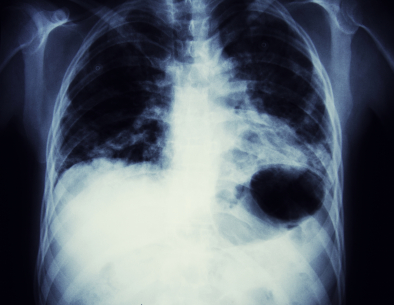Diagnosis & Prognosis
Diagnosing Mesothelioma Early Saves Lives
You know that you worked with asbestos in the past, or a close family member did. You suspect you might have cancer — and you think you have the symptoms of mesothelioma. It’s time to go to the doctor, as soon as possible.
Initial Testing for Mesothelioma
The first step to getting tested for mesothelioma is meeting with your doctor.
The physical exam begins with your doctor asking about your health history. One of the questions is whether you were ever exposed to asbestos. Be sure to volunteer that information if your doctor does not specifically ask.
Your doctor may also run tests to determine what you have. Your doctor must now confirm that mesothelioma is in fact growing inside of you. This gives your doctor a reliable diagnosis, so treatment can begin.
The doctor conducts some or all of these tests to reach a diagnosis:

- Physical examination
- Imaging studies
- Blood testing
- Fluid sampling
- Tissue biopsy
- DNA analyses
- Pulmonary function testing
According to the National Cancer Institute, an abnormal amount of fluid around your lungs, abdomen or heart may mean you have mesothelioma. Your doctor is looking for that. Getting an X-ray of the chest or abdomen reveals the presence of excess fluid.
Using Advanced Imaging to Locate Mesothelioma
The next level of testing involves imaging studies more advanced than X-ray.

Doctors use computed tomography scans, also known as CAT scans, or CT, to take detailed pictures of tissue areas where mesothelioma tumors are likely to be found. CT can spot fluid buildup as well as soft-tissue abnormalities. But it cannot normally tell if either is cancerous.
For that, doctors use a positron emission tomography (PET) scan. PET reveals cancer by observing how quickly suspect tissues absorb a radioactive, sugary tracer injected into your body. Absorbing the tracer rapidly is a strong sign of malignancy because cancer craves sugar.
Still, PET does not indicate whether any cancer it finds is mesothelioma or something else entirely.
Narrowing It Down to Mesothelioma
To begin making the distinction, your doctor orders blood tests. The American Cancer Society reports that mesothelioma typically causes an increase in two substances found in blood.
One is osteopontin. The other is soluble mesothelin-related peptide. Elevated levels of either substance narrow the possibilities to mesothelioma and a relatively small number of other cancers. Additional tests are required to eliminate all doubt about which one it is.
After blood tests, there is a laboratory analysis of the excess fluid seen by the X-ray exam. Your doctor acquires a sample of that fluid from your body
A device commonly used to obtain the fluid sample is a bronchoscope. This is simply a thin tube that the doctor gently inserts through your mouth and down into your lungs while you are under partial or full anesthesia.
A needle at the tip of the bronchoscope is used to collect some of the fluid or perhaps a small piece of cancerous tissue. Any cancer cells are in the sample and the lab has the tools to identify them by type.
Confirming a Mesothelioma Diagnosis
Hopefully, the sample in the captured specimen is large enough to be useful. If not, your doctor may order a procedure known as a biopsy. Here, a small cut is made in your chest or abdomen to give better access to the cancer. This allows the surgical removal of a more representative sample.
Back at the lab, the biopsied sample is subjected to a variety of special tests. Among them may be an immunohistochemistry study that is used to find mesothelioma’s signature proteins.

Another test is a DNA microarray analysis of the cancer cells’ genetic composition. This can help identify the type of cancer since mesothelioma has a unique chromosomal thumbprint.
The lab’s report contains all the information your doctor needs to give you a reliable diagnosis. And once you have a confirmed mesothelioma diagnosis, you can begin treatment and your fight for a longer survival period.
Get Help: Let Mesothelioma Clinic Be Your Guide
Want to learn more about how doctors make a mesothelioma diagnosis or need help connecting with the right physician? Get in touch with MesotheliomaClinic.org today to speak with our patient support center.

